|
|
         |
|
|
 |
 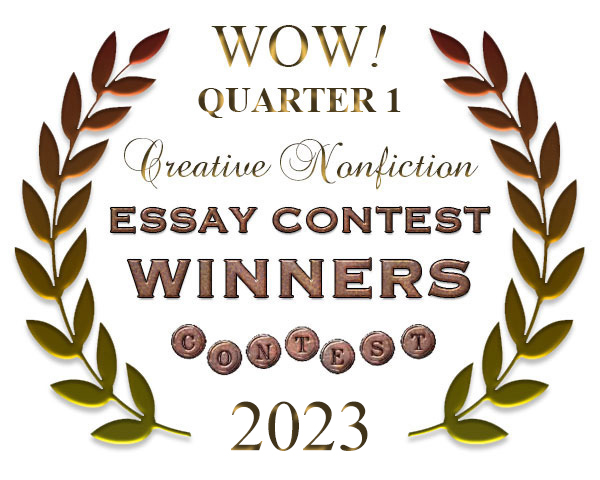
|
 |
| |
|
|
| |
|

We had an open topic this season. Our only guidelines were that submissions be nonfiction with a minimum of 200 words, and a maximum of 1,000 words.
|
| |
|
THANK YOU TO OUR CONTEST SPONSOR:
It is the sincere desire of our sponsor that each writer will keep her focus and never give up. Mari L. McCarthy has kindly donated a prize to each winning contestant. All of the items in her shop are inspiring and can help you reach your writing goals. Write on!
|
| |
|
Note to Contestants:
We want to thank each and every one of you for sharing your wonderful essays with our judges this season. We know it takes a lot to hit the send button! While we’d love to give every contestant a prize, just for your writing efforts, that wouldn’t be much of a competition. One of the hardest things we do after a contest ends is to confirm that someone didn’t place in the winners’ circle. But, believe it when we say that every one of you is a true winner for participating.
To recap our current process, we have a roundtable of 8+ judges who score equally formatted submissions based on: Subject, Content, and Technical. If a contestant scores well on the first round, she receives an e-mail notification that she passed the initial judging phase. The second round judging averages out scores and narrows down the top 20 entries. From this point, our final judges help to determine the First, Second, and Third Place Winners, followed by the Runners Up.
As with any contest, judging so many talented writers is not a simple process. With blind judging, all contestants start from the same point, no matter the skill level, experience, or writing credentials. It’s the writer’s essay and voice that shines through, along with the originality, powerful and clear writing, and the writer’s heart.
We hope that you continue to enter so we can watch you grow as writers and essayists, because each season is a rebirth of opportunity!
 Now on to the winners!
Drum roll please....

1st Place: Andreea Ceplinschi
Provincetown, Massachusetts
Congratulations, Andreea!
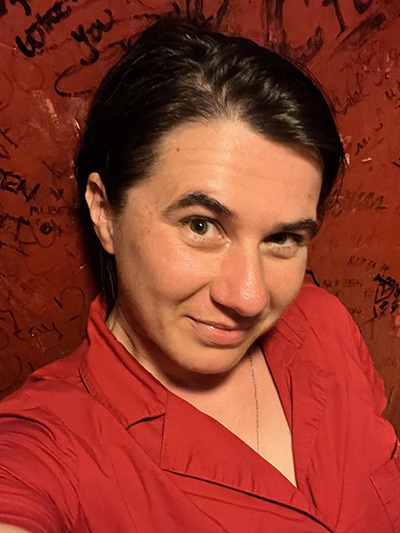
Andreea’s Bio:
Andreea Ceplinschi is a Romanian-American writer. She writes poetry, fiction, and creative non-fiction, with a decided focus on poetry. Her work has appeared in Passengers Journal, 86logic, Solstice Magazine, Cathexis Northwest Press, Hare’s Paw Literary Journal, Into the Void, Prometheus Dreaming, and elsewhere. Her work explores dysfunctional childhood family dynamics, various aspects of immigration, and trauma responses linked to abandonment issues and outsider syndrome. When not writing for herself, she acts as the poetry editor for Passengers Journal.
Printable View
You Might Be An Illegal Immigrant
By Andreea Ceplinschi
I had woken up wet with my own piss before, but this was different. When I turned over, my inner thighs stuck together with what felt like maple syrup. The pain started in my tailbone, came around and settled on my lower belly like a prize belt. I couldn’t remember fighting. I couldn’t remember falling.
“Another one, darling?”
I remembered having another one, the sweet barrel taste of brown liquor still on my breath. I blinked awake, propped myself up on my elbows and more pain leaked out of me. Blood had soaked through the mattress in a tie-dye mandala stretching outward from under my ass in hues of cherry, eggplant and brick. It smelled like low tide. It was beautiful.
I counted minutes in the shower staring at my feet until the water ran pink and the sun came up. I’d missed a patch of hair on my ankle shaving. I wondered if I had any clean underwear. I wondered if only Eastern-European mothers insisted on clean underwear for doctor’s visits.
20-minute walk to the health center. The dusty snow on the ground squeaked under the rubber soles of my sneakers. The cold helped me file away pains: some were hangover, some were not.
“Just a bad period,” I lied under my breath, fingering the laminated edges of the fake ID in my pocket. You might be an illegal immigrant if: you’re 25 and still need a fake ID. Every time the wave of cramps pulled back, I tried turning around.
“I’m fine,” but my feet kept walking.
The receptionist knew me, small women in a small town. She didn’t look me in the eye as she took my Green Card.
“It won’t scan,” I whispered. “You have to enter it manually,” but she knew. She didn’t ask for an insurance card; I didn’t have one.
The doctor’s name was Amy P. Her nametag floated on a white sea of lab coat fabric buttoned against its will over her chest. I wanted to reach over and free her bosom, then bury myself in it and cry while she healed me with the warmth of her massive breasts. I envied her nametag.
“Pain, on a scale of one to ten?”
“Seven,” on a scale of walk it off to throw it up, seven felt like a reasonable answer.
“How much blood?”
“A lot,” however much blood a twin mattress holds.
“Are you still bleeding?”
“I don’t think so,” I tried to feel the texture of the maxi pad in my clean underwear, was it spongy? I couldn’t unclench the fist in my pelvis enough to tell, the 4-inch strip of back skin showing through my hospital gown went ice cold if I tried.
“Has this ever happened to you before?”
“My first period. I was 13. I would faint.” My mother believed in intervention divine more than medical, so she waited two weeks before taking me to the hospital.
“Are you taking any medication?”
“I get Yazmin mailed to me from home. It’s late this month.”
Dr. Amy’s eyes narrowed into the folds of her cheeks. You might be an illegal immigrant if: the person talking to you raises their voice so you can understand their English better.
“Where are you from?”
“Romania,” for the 2856th time grateful to be white.
“Any chance you were pregnant?”
Not according to Romanian doctors.
Not according to the literature regarding long term use of combination birth control to manage symptoms of Polycystic Ovary Syndrome.
Not according to the length of time passed between my last remembered period and my last remembered sexual encounter.
Not according to my casual fuck friend who didn’t remember cumming inside me.
“...technically, no,” because there was also Jack Daniels.
“Urine. Bloodwork. Ultrasound.”
You might be an illegal immigrant if: you can wait 3 January hours between a doctor and a nurse without question, while bleeding in nothing but a hospital gown, socks and clean underwear.
Drip. Drip. Drip. 45 minutes for the saline IV to refill my bladder so that the ultrasound wand could tell it apart from my uterus. The gurney smelled like alcohol, bleach and rubber. The neon lights in the empty hallway made my eyes water. Drip. Drip. Drip. Morphine-softened seconds wondering how they’ll know when the IV is done dripping. If I take the needle out myself will the itch stop? Drip. Drip. The wet maxi pad molded to my labia, starting to burn. Drip. Drip. The pressure in my bladder grew and faded over anodyne cottonmouth heat. Drip.
“Sign here.”
You might be an illegal immigrant if: you need to sign a billing agreement while experiencing a medical emergency, accepting the costs of said emergency should you not meet the requirements for Medicaid eligibility. Drip. Drip.
“...miscarriage.”
“That’s not possible,” my bladder still full, ultrasound gel stains starting to crust over my swollen belly.
“Do you know how babies are made?”
Dr. Amy’s beady blue eyes sneered at me from behind her gold wire-rimmed glasses. A thin gold chain spilled down from the sides of the frames. I stared as her creamy cleavage swallowed it like quicksand. Her nametag was staring too.
“Well?”
You might be an illegal immigrant if: your first and only reaction when being rhetorically questioned by someone in a position of perceived power is to remain quiet, thus signaling remorse over your obvious stupidity.
I bought two gallons of bleach and a pint of Jack on the way home. I knew it wouldn’t be enough, but it was all I could carry. The mattress was still there, waiting, stain looking up at the ceiling like a stoned iris edged in rusted lace. I opened the Jack first and poured a little on the mattress. It drank it up. I did too.
You might be an illegal immigrant if: you’ll bleach yourself out of the mattress to keep a security deposit.
My room smelled of bleach and motherhood and I slept on the floor.
***
“You Might Be An Illegal Immigrant” was previously published in Passengers Journal in May 2021.
What Andreea Won:

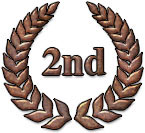
2nd Place: Gretchen Roberts
New York, New York
Congratulations, Gretchen!
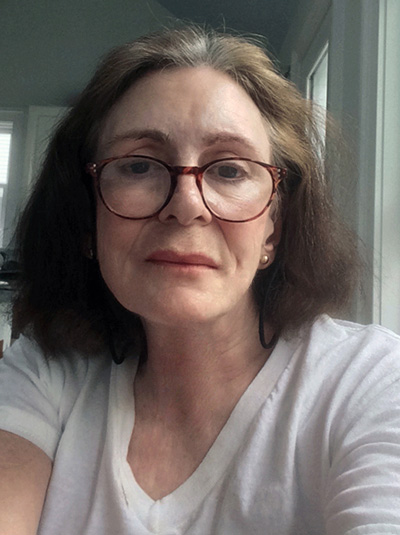
Gretchen’s Bio:
Gretchen Roberts is a former biomedical research scientist with a PhD in Cell Biology and Genetics from the Weill Cornell Graduate School of Medical Sciences in New York City. Her areas of research included cell motility, Alzheimer’s disease and, finally, the development of novel treatments for inoperable liver cancer.
Doing science is a voracious user of time, leaving one with few hours to enjoy other interests and, although Gretchen loved science, she ultimately needed a change. After spending years following one dream, it was time to follow another. Retirement from science allowed her to rediscover her other passions, one of which was painting. Art and science both involve observation as they strive to understand the world, but it was the transition from objective to subjective interpretation that captured Gretchen’s imagination.
A favorite subject for painting was her cat Mr. Dooly and, ironically, it was his death at the age of 19 that began Gretchen’s foray into writing. Writing about Mr. Dooly was both an homage to her beloved pet as well as a way to lessen the agony of loss. And thus another avenue of creativity opened as Gretchen began using writing to explore her life and the life around her.
Gretchen currently lives in Manhattan and Greenport NY with her husband and their tabby cat Eloise.
Printable View
The Abandonment
By Gretchen Roberts
When I was eight, my father moved out. I was a happy child until his departure, after which it seemed as if all my joy had been packed away in the suitcase he loaded in the car before driving off into his new life.
My father had an endless stream of friends, all of whom gradually dropped out of sight. No friends came calling to have tea and gossip about neighbors and compare stories of errant husbands. No parties filled the evenings with cigar-smoking men and women in glittery dresses, cigarettes poised on meticulously crafted nails. Instead, my mother’s companions were dirty ashtrays, pitchers of Manhattans, and me.
My mother’s days melted one into another. She scribbled endlessly in the diaries she would mindlessly toss into an ever-growing pile, a smoldering heap of madness. Periodically, she peeked out from her cloud of self-absorption and saw me lingering there. Before being eclipsed by a curtain of smoke, she would remark how relieved she was that I was a child who could take care of herself. I shrugged off this assessment of my resiliency and clung to the hope that my mother would disappear.
I occasionally visited friends, garnering their frowns when I spent more time with the mothers than I did with them. I smile now, envisioning those little girls, their small faces hot with confusion and anger as I trailed behind the mothers instead of playing dolls in the glorious kingdoms of their bedrooms. I couldn’t help myself and the mothers would unknowingly lead me as I was swept along the path their perfume left in their passing.
When I was nine, my mother nearly died, a hemorrhaging stomach ulcer sending her to the hospital. A couple, friends of my father, stepped forward to help and I was duly sent to stay with them.
The mother baked cookies and I would devour them as I leaned on this aproned pillar of strength who had decided to wrap me in vanilla and love. The father taught me to fish and, as I felt the dying anguish of the desperately flapping animals, I clutched the father’s welcoming hand.
My sojourn lasted only a few weeks before my mother, stubbornly refusing to die, returned home. I visited my adoptive family often, gliding over the hills on my bike, fleeing my mother’s wails that I had forsaken her. With unharnessed fury, she repaid my treason by asking me how it felt to know that my father had likely chosen another little girl to love, another family to care for. I answered with stoic silence, inwardly crying out that I might have been replaced by some perfect little girl outfitted in pristine dresses, unlike the coveralls I wore.
As my mother’s retaliation for my betrayal was spurned by my voiceless defiance, she resorted to promises that she would turn on the gas from the stove, allowing it to hiss through the night. My silence screamed in her face. Being mute was a tactic I had learned from my father. I often watched as he quietly listened to my mother’s accusations of his supposed dalliances, and then, without a word, walked away, ignoring the barrage of hate flung at his back.
My mother once told me to hide her liquor and, hoping to avoid the whirlwind of her wrath, I quickly complied. When she ultimately lunged at me in desperation, wanting the cache of alcohol, I raced to my bedroom while crying out where I had put the bottles. Seemingly deaf to my words, she followed me and I prayed that the door would hold against her pounding. It seemed that my life depended on the flimsy lock separating me from hell.
When I was fourteen, my mother died. Her life ended in a burst of flame started when she, presumably in an alcohol-soaked haze, dropped a burning cigarette in the crumpled sheets of her death bed. I had already been sent to live with my father, now divorced from my mother, a judge decreeing that staying with my mother was a danger to my life. I idolized my father. A design engineer, he was a laconic man and I interpreted his reserved manner as love. Having rejected my mother, I eagerly embraced my distant father to avoid facing life as if an orphan.
I cried when told of my mother’s death, tears of joy and sadness mingling on my cheeks. Happily, I was now free, but, in turn, I had to accept the finality of never knowing what a mother was. I didn’t grieve for my mother, only for a promise she failed to fulfill.
The week following my mother’s death, I was sent to visit a friend. One morning I awoke to a handprint on the wall by my bed. The day should have begun brightly, a day to be spent picking peaches to make ice cream. Instead, fear oozed from my pores. It ran down my back in sticky rivulets. Some vengeful presence had come during the night and, though no one said that I had murdered my mother, I knew the truth. I had wished her dead so many times that those thoughts had finally blotted out her existence. The friend’s mother, sensing my panic, gently prodded me, pulling out from under my mantle of terror the source of my fear. She calmed me with her solicitude and I loved her as she explained that she had put her hand on the wall to steady herself while turning back my bed the night before. My response was a peal of delight. The mother gave me a soft smile, having unknowingly returned to me some of my lost childhood.
My friend and I spent the afternoon pretending to be horses. We galloped throughout the backyard, soaring over hastily contrived jumps, neighing with glee. The sun was hot, I was with my friend and I was a horse, with homemade peach ice cream to be the reward for a day well lived.
***
What Gretchen Won:


3rd Place: Terry Tiller-Mize
Heber Springs, Arkansas
Congratulations, Terry!
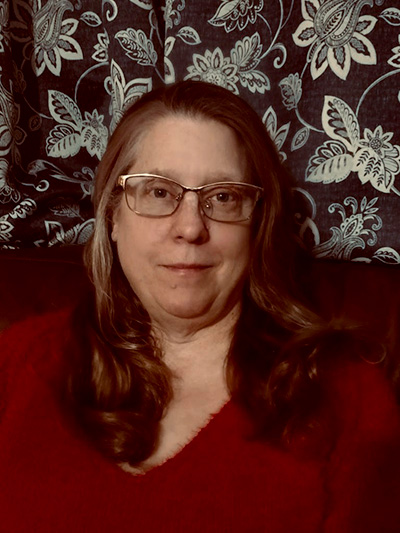
Terry’s Bio:
Terry Tiller-Mize is a misplaced Okie currently living in Arkansas with her husband of 32 years and far, far too many animals, in a tiny home they are building themselves. Terry has been writing since the 2nd grade, when she first realized that letters make words and words make stories. After a career as a college professor, helping students find their voices, she has, for the past year, begun writing for herself. Much of her work is focused on surviving and healing from childhood trauma. Terry is currently working on her first book-length project.
Printable View
7 Reasons To Be A Feminazi
By Terry Tiller-Mize
On a blind date, he asks disinterestedly about my politics, expecting cordial nothingness. When I say I am a feminist, he makes genuine eye contact for the first time. “Feminist?” He rolls the word around in his mouth like a bad taste, letting it drop, curdled, from sneering lips, “You some kinda feminazi?” He stares at me, eyebrows raised, daring me to challenge him.
I have no answers.
I have all the answers.
They are lined up in my head, stacked neatly, one on top of another, a library-cart of careful reasons and forensic arguments. None of them will come out of my mouth.
The reasons are inarticulate. How can I make him see that I am a feminist in the same way that he is left-handed: that it is the way I am made, an identity formed around me, not a choice like a dress or a new pair of shoes, when he sees feminism as a provocation.
But feminist is not merely a political label. Women do not come to it unknowingly; we learn feminism event by event. Feminism is what remains after our illusions have burned away.
1. A photograph of my mom at age 17: brunette curls, a forced smile, the bare beginnings of a bruise blooming beneath one eye. An admonition from her father against talking back. I see her slide into the cocoon of silence she maintained whenever he was around, and I am certain she never talked back again.
2. My mother and aunt talk about the women’s marches and protests they attend, bright-eyed, awed by their own audacity. My aunt’s long hair shimmers across her shoulders, held captive by a beaded headband. My grandmother stands at the stove, her mouth a harsh pencil stroke of disapproval as she stirs gravy for a dinner that is always ready at precisely 5:15 PM. Outside, a car door shuts; like small birds, my mother and aunt disappear into a bedroom. At the dinner table, they are subdued, my aunt’s hair swept back into its usual innocent ponytail.
3. My mother’s best friend dies in her bathroom while her husband and five-year-old daughter sleep in another room. The botched abortion must have felt to her like the only path, desperate as an animal chewing off its own leg to escape a trap. Her obituary reads simply, died after a short illness.
4. At eight, I take a shortcut from a friend’s house through a narrow stretch of woods that ends at my backyard, a shortcut I have taken dozens of times. Twenty feet from the road, trees beginning to close around me, I look back and see a man following me along the path fifteen feet away. For one moment, panic threatens to freeze me; I imagine his hand reaching out to grab my shoulder, and then... I turn sharply to my right, scurrying up a hill, out onto the familiar suburban streets, bathed in twilight, running for home as fast as I can, even though I know he is not behind me, that he remained just inside the edge of the woods. Even now, I sometimes dream of him grabbing my shoulder and pulling me backwards into some unknown fate.
5. At 12, I launch an unsuccessful campaign for a paper route. My mother—my I am Woman, Hear me Roar mother—refuses. The world, she says, is a very different place for girls than it is for boys. I pout, complaining bitterly to my father, who hugs me but agrees with her. A few months after ending my quest, young girls begin disappearing from in and around my quiet town. Their school-picture-faces appear on the evening news and in newspaper articles; I stare at their unknowing smiles, lost children unaware of the dangerous world around them, and silently decide that my mother was right.
6. In an 8th grade social studies class, we learn that women earn 69 cents for every dollar earned by men, a fact that I find incomprehensible. The boys in class, with the male teacher’s vocal support, are quick to argue that men do all the hardest and most dangerous work; the difference in pay is a matter of practicality, not discrimination. I remain unconvinced, but my arguments are met with disdain from the boys, condescension from the teacher, and palpable silence from everybody else. The lesson I learn is not the one being taught.
7. In my final year in college, I take a trip to New Orleans with a group of friends. The French Quarter—dirty, drunken, unabashedly gaudy—teems with people. On our last night there, one of the young women in our group goes alone to the restroom in one of the bars. She is assaulted while crossing a dance floor so crowded that not even the security cameras record it. She makes it back outside, already crying, and I instantly know what has happened. As we pile into a taxi, I see the knowledge of her attack stamped onto the faces of every woman in our group. The men understand only that a Bad Thing has happened. They congregate outside the hotel room; inside, the women make swift plans: who will call the police, who will stay with her at the hospital.
In the ER, she holds my hand tightly while she recounts her rape to doctors, nurses and police officers. Over and over, she repeats it, her voice getting steadily quieter, as if her soul is being diminished. I protest; a nurse tells me bluntly that she “needs to get used” to telling this awful new narrative. I tighten my grip on her hand and close my mouth. Two decades later, we have yet to talk about that night.
Silence forms a yawning canyon between us. I take in his face, raised eyebrows and sneer alike. “Yeah,” I say, “I’m a feminist. Now pass the fucking salt.”
***
What Terry Won:
 RUNNERS UP:
Congratulations to the runners-up! It was very close, and these essays are excellent in every way.
Click on the titles to read:
Leaving by Jean Ransom, O'Fallon, Missouri
Libre by Natalie F., Clermont, France
[We] Grew a Mountain in the Desert by Jenny Lewis, Melbourne, Florida
What to Expect When You’re Expecting Breast Cancer: Anatomy of One Procedure by Katie Snyder, Ph.D., California
Inside the Lines by Carol Ovenburg, Talent, Oregon
Pink Lemonade with Concrete Backwash by LaToya Thompson, Dallas, Texas Running to the Past by Samantha (Sam) Karl, Salem, Massachusetts
HONORABLE MENTIONS:
Congratulations to our essay contest honorable mentions! Your essays stood out and are excellent in every way.
The Darkest Hour by Julie Delany, Australia
The 63-Year-Old Soccer Freak by Jean Duffy, Somerville, Massachusetts
I Know You Like the Front of My Hand by Andrea E. Murray, Washington, DC
Only the River Knows by Diana Gittins, UK
Raw Spaghetti by Sherry South, Colorado Springs, Colorado
Desi and Me by Tess Kelly, Portland, Oregon
Lady in Blue by Susan Stopinski, Murfreesboro, Tennessee
Being a Woman at Night by Melissa Uchiyama, Tokyo, Japan
Camelot by Jennifer Braunfels, Litchfield, Maine
There’s No Place Like Home: A Journey from Daughter’s Panic to Mother’s Self-love by Rachel Fowler, London, UK
What the Honorable Mentions Won:

IN CLOSING:
This brings the Q1 2023 CNF Essay Contest officially to a close! Although we’re not able to send a special prize to every contestant, we will always give our heartfelt thanks for your participation and contribution, and for your part in making WOW! all that it can be. Each one of you has found the courage to enter, and that is a remarkable accomplishment in itself. Best of luck, and write on!
Check out the latest Contests:
https://www.wow-womenonwriting.com/contest.php
|
|
|
|
|